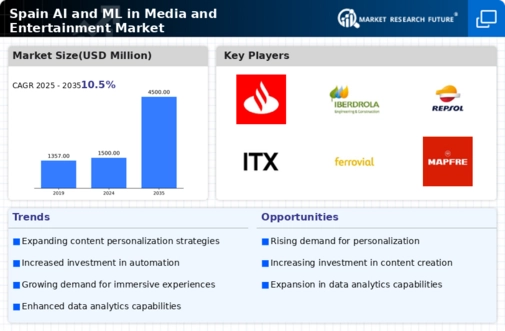Focus on Data Privacy and Ethics
The increasing focus on data privacy and ethical considerations is a critical driver for the ai ml-in-media-and-entertainment market. In Spain, regulatory frameworks are evolving to address concerns related to data usage in media applications. Companies are compelled to adopt AI solutions that prioritize user privacy while still delivering personalized content. This shift is likely to influence the development of AI technologies, as organizations seek to balance innovation with compliance. The emphasis on ethical AI practices may also enhance consumer trust, which is essential for the sustained growth of the market. As a result, the ai ml-in-media-and-entertainment market is expected to adapt to these changing dynamics, fostering a more responsible approach to technology deployment.
Rising Demand for Streaming Services
The increasing demand for streaming services in Spain is a pivotal driver for the ai ml-in-media-and-entertainment market. As consumers shift from traditional television to on-demand content, platforms are leveraging AI and ML technologies to enhance user experience. In 2025, the streaming market in Spain is projected to reach approximately €1.5 billion, indicating a robust growth trajectory. This surge necessitates advanced algorithms for content recommendation and user engagement, thereby propelling the adoption of AI and ML solutions. Furthermore, the competitive landscape among streaming providers compels them to innovate continuously, integrating AI-driven analytics to understand viewer preferences and optimize content delivery. Consequently, the ai ml-in-media-and-entertainment market is likely to witness substantial investments aimed at developing sophisticated streaming technologies.
Advancements in Content Creation Tools
Innovations in content creation tools are significantly influencing the ai ml-in-media-and-entertainment market. In Spain, the emergence of AI-powered software for video editing, animation, and graphic design is transforming how creators produce content. These tools enable faster production cycles and enhance creative possibilities, allowing artists to focus on storytelling rather than technical constraints. The market for AI-driven content creation tools is expected to grow by over 30% annually, reflecting the increasing reliance on technology in creative processes. As more creators adopt these tools, the demand for AI and ML capabilities in media production will likely escalate, fostering a more dynamic and competitive environment within the industry.
Integration of AI in Marketing Strategies
The integration of AI technologies into marketing strategies is becoming increasingly prevalent in the ai ml-in-media-and-entertainment market. In Spain, media companies are utilizing AI to analyze consumer behavior and tailor marketing campaigns effectively. This trend is evidenced by a reported 25% increase in marketing efficiency when AI tools are employed. By leveraging machine learning algorithms, companies can predict audience preferences and optimize ad placements, leading to higher engagement rates. As the media landscape evolves, the ability to harness data-driven insights will be crucial for success, thereby driving further investment in AI and ML technologies within the industry.
Emergence of Virtual and Augmented Reality
The rise of virtual reality (VR) and augmented reality (AR) technologies is reshaping the landscape of the ai ml-in-media-and-entertainment market. In Spain, the adoption of VR and AR in gaming, film, and live events is gaining momentum, with the market expected to reach €500 million by 2026. These immersive experiences rely heavily on AI and ML for real-time data processing and user interaction. As content creators explore new ways to engage audiences, the demand for AI-driven solutions that enhance VR and AR experiences is likely to grow. This trend not only expands the creative possibilities but also presents new challenges and opportunities for the industry.
















